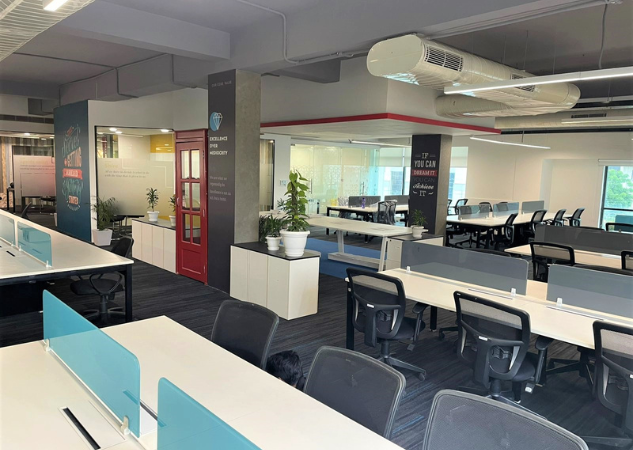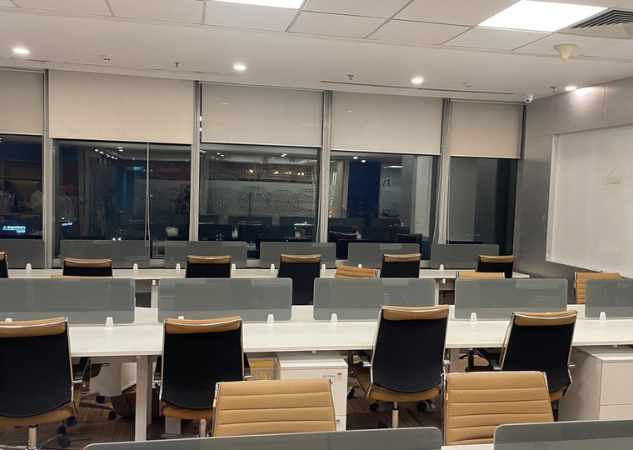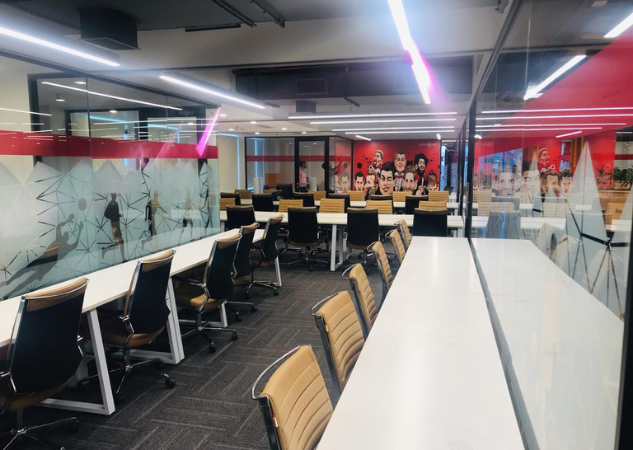Data analytics is a game-changer for boosting employee retention. By tracking engagement and behavior, companies can make smarter decisions. Here’s a step-by-step guide to get started.
💡 Are you looking for Coworking space in Gurgaon, Noida or Delhi? We are just a call away.
Call Now: 08999 828282
10 Best Tips to Use Data Analytics to Improve Employee Retention
- Identify Key Metrics
- Collect Data
- Utilize Predictive Analytics
- Segmentation
- Identify Drivers of Attrition
- Employee Sentiment Analysis
- Develop Retention Strategies
- Monitor and Measure
- Invest in Employee Development
- Create a Culture of Feedback

1. Identify Key Metrics
Start by determining which metrics are crucial for measuring employee retention. These may include turnover rates, employee satisfaction scores, engagement levels, performance reviews, absenteeism rates, and exit interview data.
2. Collect Data
Gather data from various sources within your organization, such as HR records, employee surveys, performance evaluations, and feedback mechanisms.
3. Utilize Predictive Analytics
Use predictive analytics to identify patterns and trends that may indicate which employees are at risk of leaving. Machine learning algorithms can analyze historical data to predict future turnover and identify factors that contribute to attrition.
Also Read: Top 10 Employee Retention Strategies for Your Company
4. Segmentation
Segment your workforce based on various criteria such as department, role, tenure, and performance. This can help you tailor retention strategies to different groups of employees.
5. Identify Drivers of Attrition
Analyze the data to identify the underlying reasons why employees are leaving. Common factors may include a lack of career advancement opportunities, poor work-life balance, low job satisfaction, inadequate compensation, or ineffective management.
6. Employee Sentiment Analysis
Use natural language processing (NLP) techniques to analyze employee feedback from surveys, performance reviews, and social media. This can provide insights into employee sentiment and identify areas where improvements are needed.
7. Develop Retention Strategies
Based on the insights gained from data analysis, develop targeted retention strategies to address the root causes of attrition. These strategies may include improving compensation and benefits, providing career development opportunities, offering flexible work arrangements, enhancing the work environment, and providing better management training.
8. Monitor and Measure
Continuously monitor the effectiveness of your retention strategies and measure their impact on key metrics such as turnover rates and employee satisfaction scores. Adjust your strategies as needed based on ongoing data analysis.
💡 SMBs looking for HR, Marketing, Technology and Funding solutions for their business.
Call Hello Jarvis 994 8000 800
9. Invest in Employee Development
Use data analytics to identify high-potential employees and invest in their development. Providing opportunities for growth and advancement can increase employee engagement and loyalty.
10. Create a Culture of Feedback
Last but not least, encourage open communication and feedback between employees and management. For this, regularly solicit feedback from employees to identify areas for improvement and ensure that their voices are heard.
To sum up, by leveraging data analytics effectively, organizations can gain valuable insights into their workforce and develop targeted strategies to improve employee retention, ultimately leading to a more engaged and productive workforce. The Office Pass (TOP) co-working spaces available in Delhi and NCR can help you retain employees. TOP offers all the modern-day facilities and relaxation areas to employees, keeping them motivated throughout the day for enhanced productivity at work. Contact us for more details at 08999 828282.
FREQUENTLY ASKED QUESTIONS (FAQS):
Question: What role does data analytics play in employee retention?
Answer: Data analytics helps identify patterns and trends in employee behavior, performance, and engagement, which can highlight factors contributing to turnover and inform retention strategies.
Question: What types of data are typically used for employee retention analytics?
Answer: Employee demographics, performance metrics, engagement surveys, turnover rates, tenure, and feedback data are commonly utilized to assess retention factors and trends.
Question: How can data analytics help predict potential turnover among employees?
Answer: By analyzing historical data on turnover rates, performance metrics, and engagement levels, predictive models can identify at-risk employees and flag potential turnover risks before they occur.
Question: What are some common challenges in implementing data analytics for employee retention?
Answer: Some challenges in implementing data analytics for employee retention include:
- Data integration from multiple sources
- Ensuring data privacy and security
- Interpreting complex data sets to derive actionable insights
Question: How can data analytics be used to personalize retention strategies for different employee groups?
Answer: By segmenting employees based on demographics, performance, tenure, and other factors, analytics can identify unique retention drivers for different groups and tailor interventions accordingly.
Question: What role does sentiment analysis play in employee retention analytics?
Answer: Sentiment analysis of employee feedback, social media activity, and performance reviews can provide insights into employee satisfaction, morale, and potential areas of concern affecting retention.
Question: How can data analytics help optimize compensation and benefits packages to improve retention?
Answer: By analyzing compensation data alongside turnover rates and employee feedback, organizations can identify whether compensation packages are competitive and adjust them accordingly to retain top talent.
Question: What are some key metrics to track in employee retention analytics?
Answer: Metrics such as turnover rate, voluntary turnover rate, retention rate, time-to-fill vacancies, and employee engagement scores are commonly tracked to assess retention effectiveness.
Question: How can data analytics help identify underlying causes of employee dissatisfaction or disengagement?
Answer: By analyzing factors such as workload, managerial effectiveness, work-life balance, career development opportunities, and organizational culture, analytics can pinpoint root causes of dissatisfaction.
Question: How can organizations leverage predictive analytics to proactively address retention challenges?
Answer: Predictive models can forecast future turnover risks based on historical data, enabling organizations to implement targeted interventions, such as training programs, career development initiatives, or leadership coaching, to mitigate those risks and improve retention rates.


















